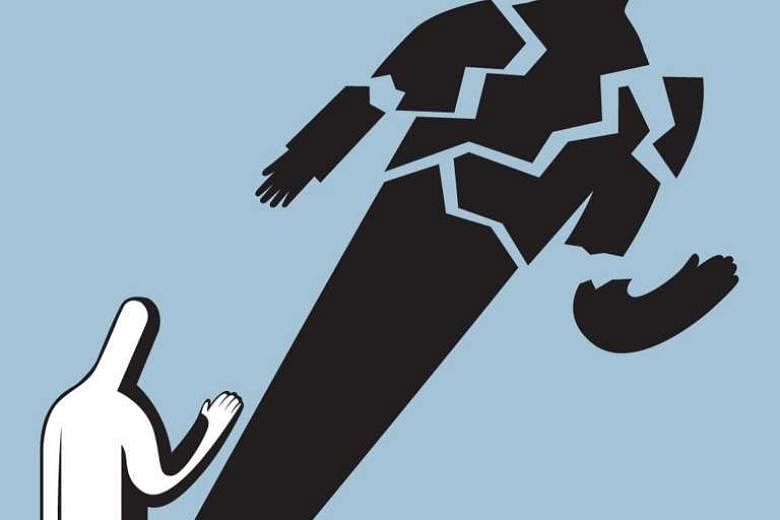The bare facts of the case of filicide were reported in the media: On Sept 13, 2014 (which was the eve of her 42nd birthday), the mother of a seven-year-old autistic boy got him to stand on a stool and face the kitchen window.
Gripping his calves, she heaved him out of their ninth-floor Housing Board flat. It was reported that she was "seized by thoughts that he was the reason for her exhaustion and marital problems".
The woman, who was previously diagnosed as having major depression, had defaulted on her treatment and was in a relapse of her illness.
At her trial, the woman's lawyer, in pleading for a lenient sentence, argued that his client had "sacrificed her own well-being for the needs of the family and was stretched to breaking point".
Apparently moved by the plight of the defendant and in sentencing her to five years of imprisonment which appeared to be a conflation of punishment and therapy, the judge said to her: "I hope you recover well and that you can return home much stronger emotionally to rebuild your family and personal life."

About a year before this case in Singapore, a woman in the United States named Kelli Stapleton tried to kill her 14-year-old autistic daughter and herself. According to Stapleton, her daughter had been unusually difficult and aggressive, had assaulted her repeatedly and had twice knocked her unconscious.
The extensive media coverage of the case was on the whole sympathetic towards the mother, who was portrayed as a victim of a medical and social service system that failed to provide adequate support, which supposedly put her under enormous duress.
The airing of an apparently commiserating interview with Stapleton, who was then in prison, by a popular TV talk show incited angry responses from a number of advocacy groups.
The Autistic Self-Advocacy Network, an organisation consisting of autistic people devoted to advancing disability rights and whose slogan on its website says "Nothing about us without us", issued a statement. It emphasised that "the victim of murder is not the murderer… It is always wrong for a parent to murder their child. There is never a justification. There are always other options. The only victims here are disabled people murdered by those we should have been able to trust the most."
Mr Peter Berns, chief executive of The Arc, the world's largest community-based organisation of and for people with intellectual and developmental disabilities, commented in The New York Times Magazine (December 2015) that while there are many instances of parents or other caretakers killing their loved ones, they are indubitably unjustifiable criminal acts. He also thought that coverage of these kinds of incidents tended to give the impression that such killing of a disabled child is somehow tolerable. "There's too much of a bias that their lives really don't have value," he says. "There's some sense that they're better dead than living."
Many victims of filicides were children with disabilities, including those with autism. Those parents who killed their autistic children would often say or imply that their children were social misfits and ending their lives was to end their present and future suffering - a sort of "mercy killing". According to the United States National Council on Disability, the courts of law generally seemed to treat these filicides as understandable, albeit tragic, consequences of raising an autistic child in an environment lacking in services and resources - as reflected by the light sentences meted out to the perpetrators - although, in a number of cases, the lack of services was not an issue.
MANIFESTATION OF AUTISM
Autism is a complex brain disorder of unknown causes and is defined as a pervasive disorder because it affects most facets of behaviour, sensory perceptions, and motor functioning. It is also a form of developmental disability as there are impairments in social communication and social interaction.
In the medical nomenclature, it is now termed as autism spectrum disorder to reflect (and encompass) the wide swathe of symptoms and severity, including delayed or lack of speech and poor non-verbal communication; and diminished interests in human relationships while possibly having a fascination and attachment to non-animate objects such as spinning wheels.
There can be exquisite and distressing hypersensitivity to sounds, touch and light; repetitive movements like hand flapping ("stimming") or obsessive stereotypic behaviour; self-injurious behaviour like hand-biting or head-banging; and violence towards others.
Other than the multiplicity of symptoms, the severity also varies widely. It includes those with what used to be known as Asperger's syndrome: These are higher- functioning individuals with normal-to-high language and intellectual ability but lacking social skills, and they may be able to live independent and fulfilling lives. At the more severe end of the spectrum are those who seemed to exist in an inner world that is inaccessible and inexplicable to others.
Autism can be ameliorated to a certain extent, especially if detected early, but treatment is very labour-intensive and protracted while outcomes are uncertain and costs high.
Carers of severely autistic children need support - including the acknowledgement that the task of caring is arduous and exacting in both human and financial costs, requiring assistance.
The state could alleviate the burden of these carers with the appropriate policies, including subsidised childcare leave, subsidies for home care, special education and therapy, and social service support that provides close follow-up, respite care and residential placement.
Unfortunately, it sometimes takes a tragedy to change things. After a mother in New Zealand strangulated her 17-year-old autistic daughter in 1997, the government initiated an inquiry into the provision of services for autism which then led to a number of initiatives, including an intervention programme to help parents with pre-school autistic children, support groups for parents, and home visits by experts.
UNRECIPROCATED LOVE
In his book Far From The Tree: Parents, Children And The Search For Identity, Andrew Solomon explored the inherent pathos of parents caring and loving a child who is incapable of reciprocating that affection.
The problem for parents of severely autistic children, he noted, is that the emotion underlying parental love is neither inexhaustible nor entirely unconditional; it is "eventually not gratis" - as "to love a child who does not evidently mirror your love exacts a more terrible price than other love".
The daily heartache and heartbreak, the grind of the unremitting caregiving, the sleepless exhausting nights, and the awful realisation of shouldering a lifelong responsibility for that child - all that and possibly more can lead to sadness, hopelessness and that mounting anxiety about the child's future when they are no longer able to look after their offspring.
Clinical depression can easily develop and, when it does, it can distort thinking, narrowing options to only those which are bleak and negative. It can lead to that abyss from which there would seem to be no escape except through death.
And when that death blow is dealt by a parent, the rest of us who read about the case, or encounter it, have mixed feelings about it. There are horror and revulsion at the death, but our empathetic instinct might also make us refrain from judging the perpetrator: Since we have not walked in his or her shoes, we cannot gauge that depth of pain and that degree of desperation, and we might wonder what we would have done in that terrible situation.
If truth be told, there would probably be other parents of children with autism who, in some dark moments, would also wish their children dead or hope that they will not outlive them.
And yet, the overwhelming majority of such parents do not kill their children. They continue to care for them with all that swirling mixture of love, responsibility, despair and ambivalence. It behooves us as a caring society to accept and value these children, no matter where they are on that wide-ranging spectrum.
As a corollary to that, it also behooves us to recognise and accord the work of caring for them the importance, respect and dignity that it deserves.
But beyond mere words, these should be expressed and made manifest with a raft of concrete and accessible aids and supports.
•The writer is vice-chairman of the medical board (research) at the Institute of Mental Health.


